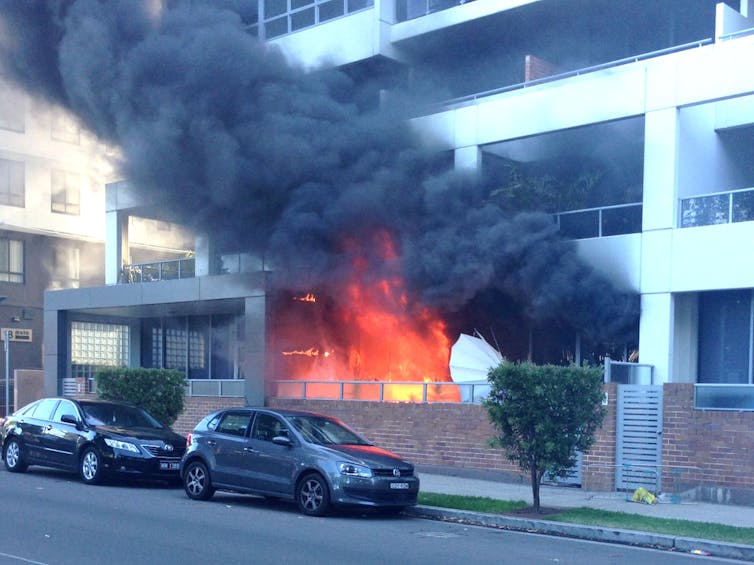Dealing with apartment defects: a how-to guide for strata owners and buyers
- Written by Sian Thompson, Research Associate, City Futures Research Centre, UNSW
If you own an apartment – or are thinking of buying one – the recent news about building quality has been worrying. There have been evacuations at the Opal and Mascot apartment towers in Sydney, cladding fires at the Lacrosse and Neo200 towers in Melbourne and the Grenfell Tower tragedy in London. While most buildings won’t have such serious defects, many do have significant problems, and owners must get these fixed so they aren’t a health and safety risk.
Read more: The big lesson from Opal Tower is that badly built apartments aren't only an issue for residents
Even if the defect doesn’t affect their apartment, this is often the shared responsibility of all owners in the building. It’s essential they have access to good guidance on dealing with defects in strata properties – but this isn’t always easy to find. To help owners, we’ve worked with the Strata Community Association (NSW) to produce a free guide to rectifying defects.
 The online guide to rectifying defects takes apartment owners step by step through what they should do.
City Futures Research Centre, UNSW/SCA (NSW), CC BY
The online guide to rectifying defects takes apartment owners step by step through what they should do.
City Futures Research Centre, UNSW/SCA (NSW), CC BY
This how-to guide takes current and potential owners through the steps of identifying and rectifying defects, with links to helpful resources. It includes advice on getting a defect report, whether the developer or builder might be responsible for fixing the issue, how to choose and manage building experts, and how to manage communication with owners and workers.
The guide has been developed for New South Wales, but may also be helpful if you have a strata property elsewhere in Australia.
So what key things should owners know?
Each building’s experience with defects will differ. But there are some key principles owners should always keep in mind – these underpin all the advice in our guide.
Ignorance isn’t bliss: as an owner, you are automatically a member of the owners corporation/body corporate. This means you have a legal responsibility to maintain and repair the common property, including dealing with defects.
Information is power: gather all the information you can when investigating defects. For buyers, a good strata report is essential. For owners of new buildings, getting a professional defects report is particularly important. It’s worth the cost.
Focus on potential fire, waterproofing or structural issues. These defects can be hard to see but expensive to fix. They also have major impacts on health and safety.
 The big things to look out for are potential fire risks and waterproofing or structural issues. Though often hard to see, these problems can turn out to be costly.
AAP
The big things to look out for are potential fire risks and waterproofing or structural issues. Though often hard to see, these problems can turn out to be costly.
AAP
The early bird catches the worm: you can never start looking for and dealing with defects too early. Be aware of time limits on building warranties.
In NSW, for minor defects, you have two years to start the process of getting the builder or developer to fix the defect. For major defects, you have six years. If your building is outside the warranty period, you may have to fund rectification yourself.
Sharing is caring: make sure you report defects to people who need to know. This will include your owners corporation, but also your insurer(s) and Fair Trading (especially if the defect is major).
Keeping good records is also important. Records are needed in case there are disputes and to show future buyers the building is well-maintained.
Look after yourself: dealing with defects can be financially and emotionally draining. Conflict can occur, and collective decision-making can feel very slow.
To help navigate the process, you want the best experts by your side. They include lawyers, building specialists, strata managers and project managers. And always get a second opinion if in doubt.
 A Mascot Towers apartment owner feels the emotional toll in August 2019 after giving his statement to a NSW parliamentary inquiry into building standards and disputes.
Dean Lewins/AAP
A Mascot Towers apartment owner feels the emotional toll in August 2019 after giving his statement to a NSW parliamentary inquiry into building standards and disputes.
Dean Lewins/AAP
What else can be done to improve the situation?
While our guide will help apartment owners and buyers to work through defect issues, state and territory governments could also do more to help out owners.
Since the Opal Tower evacuation, the NSW government has moved to tighten building laws to reduce future defects.
Read more: New NSW building law could be a game changer for apartment safety
These legal changes are important, but they are unlikely to completely get rid of building defects. And buildings built before the new laws might still have problems down the track.
One way governments can help owners who face such issues in the future is to make it easier for them to get the information they need to deal with defects effectively and efficiently.
Currently, strata buyers and owners suffer from what economists call “information asymmetry” – they don’t have access to all the information they need to make informed decisions about building quality. For example, developers might not give new owners all the details about how their building was built, what materials were used, or which builders and tradespeople worked on it.
Read more: Lack of information on apartment defects leaves whole market on shaky footings
Developers should be required to give owners better information, as well as taking more responsibility for fixing defects.
Owners corporations should be encouraged to keep building records on defects up-to-date and make this information available to prospective buyers and relevant authorities.
And governments should support further professionalisation of the strata and building management industries, to make sure owners have the best possible support to navigate defects issues and care for their buildings.
Authors: Sian Thompson, Research Associate, City Futures Research Centre, UNSW





